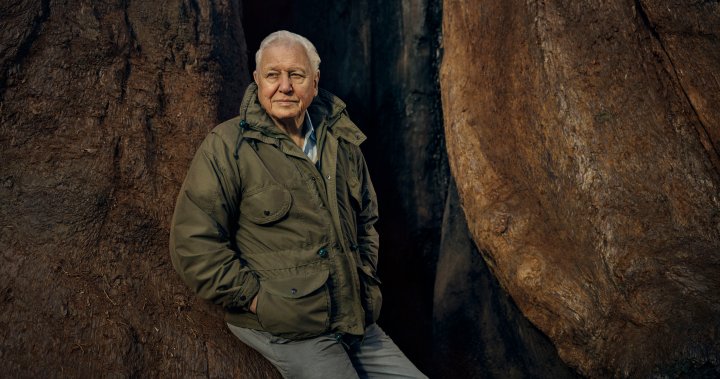Sir David Attenborough is going green. Very green.
The legendary English broadcaster, biologist, natural historian and author, at age 96, is travelling the globe in the latest BBC Earth landmark series, The Green Planet, to explore Earth’s biodiversity and the secret life of plants.
Filmed in 27 countries over four years, the five-part documentary marks the first time Attenborough has returned to filming the world of plants since his 1995 series, The Private Life of Plants.
Read more:
‘A Perfect Planet’: David Attenborough talks narrating nature series amid COVID-19 lockdown
The Green Planet even includes stops in Canada, where he takes a closer look at maple trees waking from hibernation and lodgepole pines being attacked by mountain pine beetles.
Attenborough shared his thoughts on the series with Global News, and outlined some of the most astonishing plants featured on the show.
—
Can you tell us a little bit about filming this brand new BBC Earth series, The Green Planet?
David Attenborough: In a sense, the series itself is slow-growing, like plants. We started [filming] a long time ago, before COVID. And so I was dashing around interesting places, in California and so on, in a way that hasn’t been possible for the last two years. So I appear in all these different parts of the world quite frequently, more than any other [series], for some time.
Sir David Attenborough in an aerial tram, travelling through rainforest canopy in Costa Rica.
BBC Video
In your travels on the series, you interacted with lots of plants. Are there any plants that really stuck in your mind?
One of the really great, profoundly moving experiences was to go to the giant sequoias in California, these enormous trees. It’s not an accident that there’s a cathedral-like feeling when you go amongst them. They are immense things, some of the tallest ones are enormous. But what this program did was to use another of the inventions that you might think had very little to do with plants, technical inventions, that changed natural history photography in the past 10-20 years — drones. When you see the final sequence in the programs and [the camera] suddenly rises above the tree tops. and you see these giants. It’s a marvellous sequence.
I heard you had a very scary encounter with a cactus during filming, didn’t you?
Yes! The cholla really is a physical danger. There are very dense spines in rosettes, so they point in all directions. And if you just brush against it, the spines are like spicules of glass, I mean they are that sharp and they go into you and you really have trouble getting them out! So that is a really dangerous plant.
Sir David Attenborough surrounded by Saguaro Cacti in the Sonoran Desert in Arizona.
BBC Studios
Can you talk to us about the water lilies in Pantanal, Brazil?
Water lilies are extremely aggressive. And their battleground is the surface of the lake and the surface of the water, so it’s a very narrow battle. The Giant Water Lily, which produces leaves famously that can hold a small baby, has a bud that comes up loaded with prickles. And it comes up into the surface and starts expanding, with these spikes pushing everything else out of the way. And in the end the lake ends up as just solid Giant Water Lilies butting up against one another, with no room for anything else at all. It’s one of the most empire building aggressive plants there is. Everybody says how wonderful it is, but nobody says how murderous it is.
Anybody who takes a walk probably sees more plants than you see animals, so why do you think people have not been as engaged with plants as they have been with animals?
Because they apparently just sit there being a plant. You could either take them or leave them or you could dig them up, or throw them aside. They don’t react, they don’t resent it, they just die. We don’t engage with plants enough.
—
This interview has been edited and condensed.
—
‘The Green Planet’ premieres Wednesday, July 6 at 9 p.m. ET/PT exclusively on BBC Earth, and on the BBC Earth Prime Video channel in Canada.
© 2022 Global News, a division of Corus Entertainment Inc.



